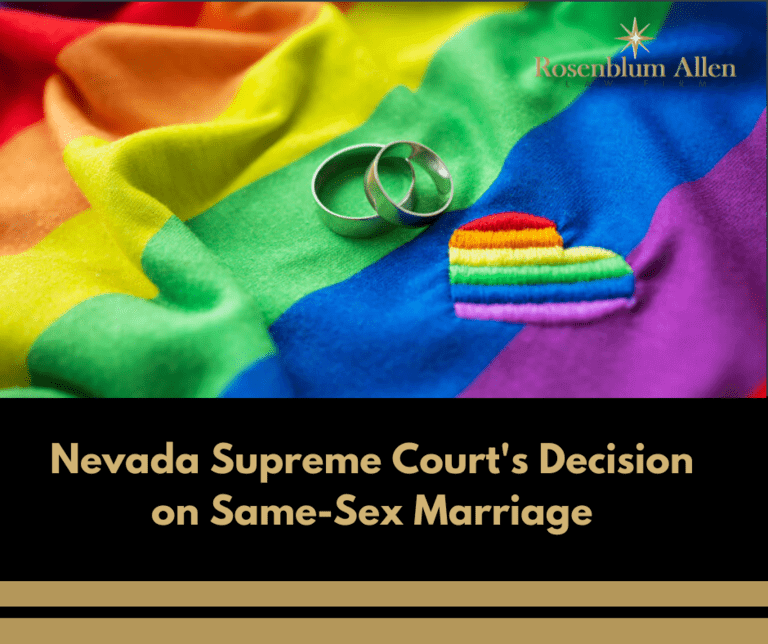Nevada Supreme Court’s Decision on Same-Sex Marriage Date: A Story of Rings, Rights, and Resolutions
Let’s dive into a real-life love story with its twists, turns, and a hefty dose of courtroom drama.

Once Upon a Time in 1991...
Richard Candelaria and Michael Kelly’s love story began in the sunny month of July 1991. By November, they had moved in together, symbolizing the start of a shared life. The next year was special; they exchanged rings in July 1992, a beautiful gesture of commitment. However, it took another 16 years, until California legalized same-sex marriage in 2008, for them to replace their old rings with new ones and officially say, “I do.”
The Plot Thickens in 2020
Almost 12 years after their official wedding, in 2020, Michael decided to file for divorce. Richard hit back with his claims, saying they had a mutual understanding to treat properties acquired since their symbolic ring exchange in the early ’90s as joint assets. After some discussions, they agreed to share most of their assets. But here’s the twist: two major assets remained disputed—Michael’s 401(k) account from 1984 and shares of stock he got between 1996 and 2004.
The Courtroom Drama
At the trial, Michael made his stance clear: he got his 401(k) and the stocks way before their 2008 wedding. And he didn’t add a penny to his 401(k) after that. So, in his eyes, the 401(k) and the stocks were solely his.
Richard, however, sang a different tune. He believed their marriage truly began when they exchanged rings in the ’90s. He even said they would’ve been legally married back then if not for Nevada’s ban on same-sex marriage.
But Michael didn’t see it that way; for him, their marriage began only in 2008.
In the end, the district court sided with Michael. The trial judge declared that the duo officially tied the knot in 2008 and that there wasn’t any legal basis to push that date back to when their love story began.
Feeling that justice wasn’t served, Richard decided to appeal.
Delving deeper into Richard and Michael’s courtroom saga, it becomes essential to understand the broader context. Their personal journey was closely intertwined with the legal evolution surrounding same-sex marriage, especially in Nevada.
The Backdrop: A Tale of Changing Laws
When Richard and Michael started their relationship in 1991, Nevada was pretty clear – no recognition for same-sex marriages. Come 2002, Nevada’s stance became even firmer. Voters chose to cement in the state’s constitution that only marriages between a man and a woman would be recognized.
However, the tide began to turn in 2014 when the Ninth Circuit Court of Appeals declared Nevada’s ban on same-sex marriage unconstitutional. They said Nevada should recognize same-sex marriages. A year later, the Supreme Court of the United States made a historic decision in Obergefell v. Hodges. They declared that marriage, a fundamental right, should be accessible to same-sex couples just as it is to opposite-sex couples.
Fast forward to 2020, Nevada voters, showing how far public opinion had shifted, made another significant move. They changed the state’s constitution to ensure that marriages would be recognized and licenses issued to couples regardless of gender.
The Nevada Supreme Court Weighs In
The big question was about the retroactive application of the Obergefell decision. Does it mean that same-sex marriages, performed out of state before 2014, should now be recognized by Nevada?
The US Supreme Court, in earlier cases, has often emphasized that their Constitutional decisions generally have retrospective effects. This means when they interpret the Constitution in a new light, that interpretation should apply to past events, not just future ones.
Standing on this principle, the Nevada Supreme Court echoed decisions from other jurisdictions that the Obergefell ruling should be applied retroactively. For instance, courts in Colorado and Montana have recognized that Obergefell should retroactively validate same-sex marriages (or common-law marriages) that existed before the decision.
Bringing this back to Richard and Michael, the Nevada Supreme Court highlighted that the Obergefell decision meant that even if Nevada had a ban in 2008, Richard and Michael’s California marriage from that year must be recognized.
RICHARD’S REQUESTS WENT BEYOND Obergefell
Richard wanted the Court to do more and argued that the Nevada court should “backdate” the start of a same-sex couple’s marriage to the time they would have been married but for the unconstitutional ban. Specifically, Richard wanted to go all the way back to 1991 when the parties became serious. The Nevada Supreme Court disagreed.
Let’s break down the key points:
- Richard’s Request: Richard wants the court to consider his relationship with Michael as having started in 1991 or 1992, the time when they would have married if not for the unconstitutional ban on same-sex marriages in Nevada. Richard emphasizes that he isn’t asking for Nevada to recognize “common-law” marriage but rather wants a remedy for the past unconstitutional ban.
- In re Madrone: Richard’s main argument comes from an Oregon case that fashioned a remedy for same-sex couples seeking parentage rights. The crux of the decision was based on whether the couple would have married earlier if not for the ban. While this is persuasive authority and not binding, Richard hoped to make an analogy to his own situation.
- Nevada’s Stance on Common-Law Marriage: The Nevada court argued that adopting the “but-for” test from the Oregon case would effectively mean recognizing a common-law marriage. Since Nevada law expressly prohibits common-law marriages, the court would be acting against the statute by accepting Richard’s claim.
- Distinguishing Statutory and Common-Law Doctrines: The decision notes that the courts might have more flexibility when it comes to molding common-law doctrines (rights and remedies crafted by judges over time) as opposed to statutory laws (enacted by the legislature). The cases Richard cites to persuade the court mostly involve judicial adjustments to common-law concepts.
In essence, while the court recognized the difficult and inequitable position Richard found himself in due to past unconstitutional bans on same-sex marriages, they felt bound by the statutory law prohibiting common-law marriages. The court emphasized that it is not within their purview to rewrite clear and unambiguous statutes, even if they may seem unfair in specific circumstances.
The Moral of the Story
This decision serves as a reminder that while love stories are shaped by emotions and personal milestones, the legal world revolves around formalities and written laws.
Richard and Michael’s tale shows that when it comes to dividing assets, the court’s scales tip based on laws, not love stories.

Conclusion
The Nevada Supreme Court’s decision in Candelaria v. Kelly highlights the complex interplay between evolving social norms, individual rights, and statutory law.
While the justices recognized the unfairness that resulted from past discrimination against same-sex couples, they ultimately felt constrained by Nevada’s statutory prohibition on common-law marriage.
The case underscores that the judiciary must often balance competing principles when tackling civil rights issues.
Though Richard and Michael’s love story spans decades, the law only recognized their formal marriage ties beginning in 2008.
When love and law clash, the scales of justice weigh the written letter over the spirit of equity.

Frequently Asked Questions
What was the main issue in Candelaria v. Kelly?
The main issue was whether the US Supreme Court’s decision in Obergefell v. Hodges, which legalized same-sex marriage nationwide in 2015, should apply retroactively in Nevada to recognize Richard and Michael’s relationship beginning in the 1990s rather than just their 2008 California marriage.
What did Richard Candelaria argue?
Richard argued that but for Nevada’s ban on same-sex marriage, he and Michael would have married much earlier, likely in the 1990s, when they exchanged rings and began cohabitating. So he wanted the courts to recognize a date earlier than their 2008 marriage due to the past unconstitutional law.
What was Nevada’s stance on the issue?
Nevada prohibits common-law marriages. The State argued that recognizing Richard’s claim would validate a common-law marriage, which Nevada statutes expressly forbid.
Why did the Nevada Supreme Court rule against Richard’s request?
The Court felt Richard’s request would require them to contravene Nevada’s statutory prohibition on common-law marriage. They saw this as overstepping their judicial authority and infringing on the legislature’s role.
Does this mean common-law marriages are never recognized in Nevada?
No. The Court said they may have more flexibility in shaping judge-made common law doctrines. However, directly countermanding statutory law is more challenging for a court to justify.
Did the US Supreme Court’s Obergefell decision apply retroactively?
Yes, the Nevada Supreme Court said Obergefell requires retroactive recognition of same-sex marriages from before 2015, such as Richard and Michael’s 2008 California marriage. But their relationship before 2008 did not qualify.
How are assets divided for a same-sex divorce in Nevada?
As with different-sex divorces, assets acquired during the recognized marriage are joint property subject to equitable division. However, assets obtained before the legal marriage date remain separate property belonging to the original owner.
What is the key takeaway from this case?
The case highlights how social progress through court rulings can outpace changes in statutory law. Though the justices recognized the unfair impact of past discrimination, they deferred to the legislature’s role in prohibiting common-law marriage when deciding this dispute.

Glossary
Common-law marriage: A marriage that is legally recognized even though no formal marriage ceremony took place. It was established by a couple living together and holding themselves out to be married, not recognized in all states, including Nevada.
Obergefell v. Hodges: 2015 Supreme Court case that deemed same-sex marriage bans unconstitutional across the United States, legalizing it in all 50 states.
Retroactive: Applying to or determining something that occurred in the past. In law, retroactivity often refers to whether a new ruling applies to previous events and periods.
Statutory law: Laws enacted by legislative bodies, such as state legislatures or Congress. Statutory laws are codified and written in state or federal code books.
Precedent: A previously decided court case establishes an authoritative principle or rule that judges rely on when determining present cases. Binding precedent must be followed by courts lower down in the hierarchy.
Persuasive precedent: A precedent decided in one jurisdiction that carries significance but is not mandatory authority in another jurisdiction. Persuasive precedent means the reasoning is influential but not binding.
Common law: The body of law developed from judicial decisions and rulings over time rather than from state or federal statutes. Common law fills in gaps left by statutes and constitutions.
Judicial review: The judiciary’s power to examine laws, statutes, and government actions to determine their constitutionality. Allows the courts to nullify statutes that contravene the Constitution.
Equity: A body of legal doctrines and principles intended to provide remedies or modify outcomes where applying strict legal rules would allow injustice. Invoked to achieve fairness and just results.

More Resources for You
Molly Rosenblum, Esq., our distinguished lead attorney, not only offers expert legal services but has also developed a wide range of resources to assist you in various aspects of family law. These resources, thoughtfully prepared and available on the Rosenblum Law website, are designed to provide you with valuable information and guidance tailored to your specific needs in family-related legal matters. Here are some key resources that you might find particularly helpful:
Las Vegas Family Law Attorneys: A comprehensive guide to understanding family law in Las Vegas, offering insights and legal expertise to navigate through complex family law issues. Explore the guide.
Family Court Las Vegas: An informative resource detailing the processes and procedures in the Family Court of Las Vegas, helping you understand what to expect. Learn about Family Court.
Common Law Marriage in Nevada: Clarifies the legal standing and implications of common-law marriage in Nevada, a topic often surrounded by misconceptions and confusion. Understand common law marriage.
Name Change Las Vegas: Offers a step-by-step guide on how to legally change your name in Las Vegas, outlining the necessary procedures and legal requirements. Learn how to change your name.
Nevada Power of Attorney: Provides detailed information on creating a power of attorney in Nevada, enabling you to make informed decisions about granting someone the authority to act on your behalf. Read about Nevada Power of Attorney.
How to File a Motion in Family Court: A helpful guide for those needing to understand the process of filing motions in family court, ensuring you are well-prepared for your legal proceedings. Learn to file a motion.
Family Court Mediation: Offers insights into the mediation process in family court, providing a peaceful and cooperative approach to resolving disputes. Understand mediation processes.
Unbundled Attorney: Explains the concept of unbundled legal services, allowing you to select specific legal services rather than full representation, tailored to your needs and budget. Explore unbundled legal services.
Nevada Adoption: A resourceful guide offering essential information and procedural knowledge for those considering or going through the adoption process in Nevada. Read about Nevada adoption.
Molly Rosenblum, Esq. aims to empower you with these resources, ensuring you have access to the necessary information and guidance to navigate the complexities of family law. We encourage you to utilize these valuable resources to make informed decisions in your family law matters.

Offsite Resources You May Find Helpful
Here are some suggested offsite resources related to the article that readers may find useful:
Lambda Legal: Legal organization advocating for LGBTQ civil rights, with resources on marriage equality.
National Center for Lesbian Rights: Legal advocacy organization for LGBTQ community, with info on relationship recognition.
GLBTQ Legal Advocates & Defenders (GLAD): Legal rights organization in New England focused on LGBTQ issues.
The Williams Institute: UCLA think tank conducting research on sexual orientation and gender identity law and public policy.
Pew Research Center: Nonpartisan research organization with data and reports on same-sex marriage trends.
American Civil Liberties Union (ACLU): Nonprofit advocacy group that was involved in key same-sex marriage cases.
Supreme Court of the United States: Official website with access to court opinions, including Obergefell v. Hodges.
Obergefell v. Hodges, 576 U.S. 644 (2015): Landmark US Supreme Court case establishing the right to marry for same-sex couples.

A Special Message from Our Lead Attorney

Molly Rosenblum, Esq
Dear reader,
Thank you for reviewing the information I’ve provided about Nevada family law and the Candelaria v. Kelly case.
I hope these resources have helped increase your understanding of our state’s complex legal issues surrounding same-sex marriage and divorce.
My team and I know this can be a complex and emotional process. We are always happy to have an initial discussion to learn more about your situation and provide guidance on the next steps.
Please call our office at (702) 433-2889 to schedule a consultation. There is a fee for an initial meeting, which allows us to review your case details and documents.
This helps us provide you with the most accurate advice moving forward.
We look forward to hearing from you soon and assisting you through this challenging time.
Sincerely,
Molly Rosenblum, Esq.
The Rosenblum Allen Law Firm



